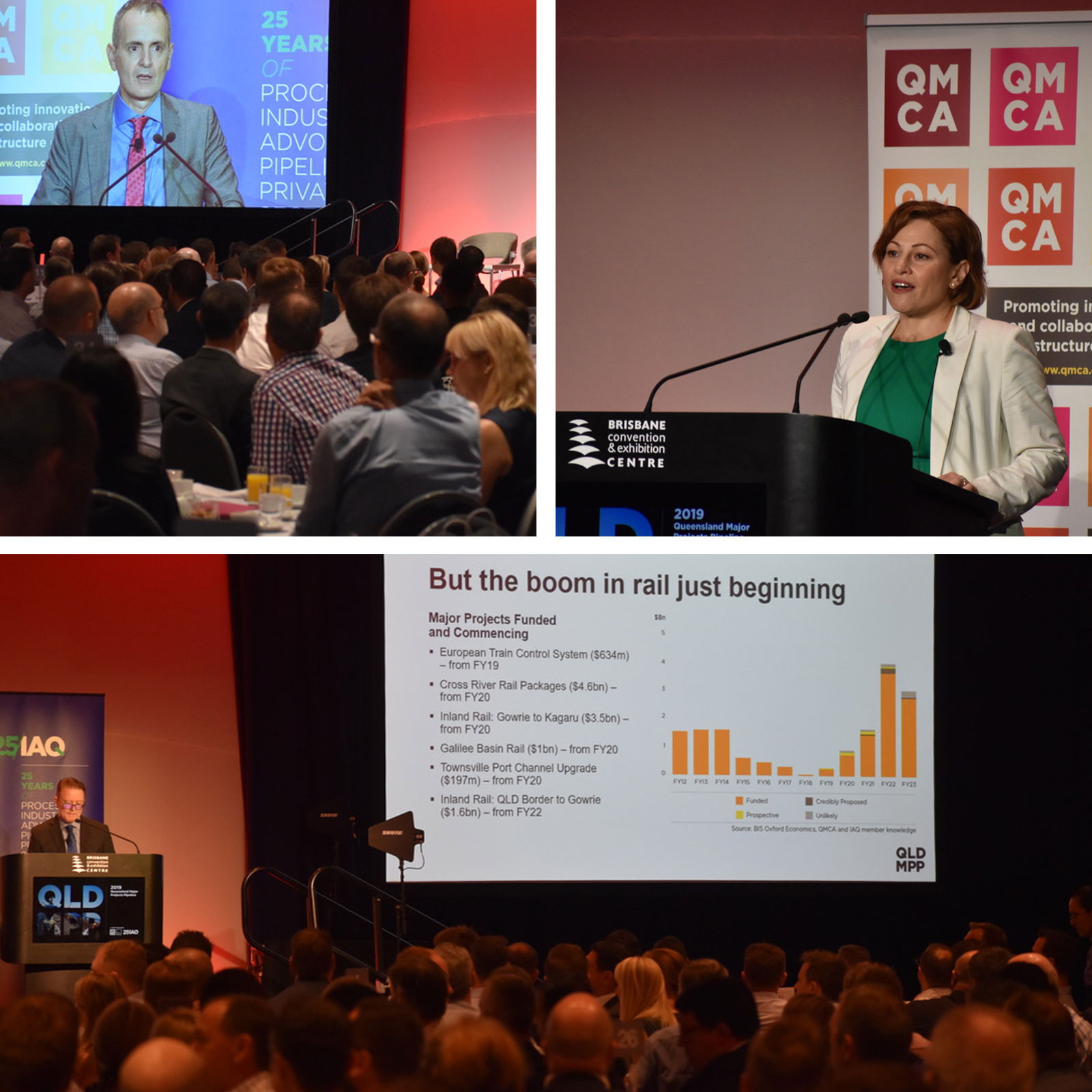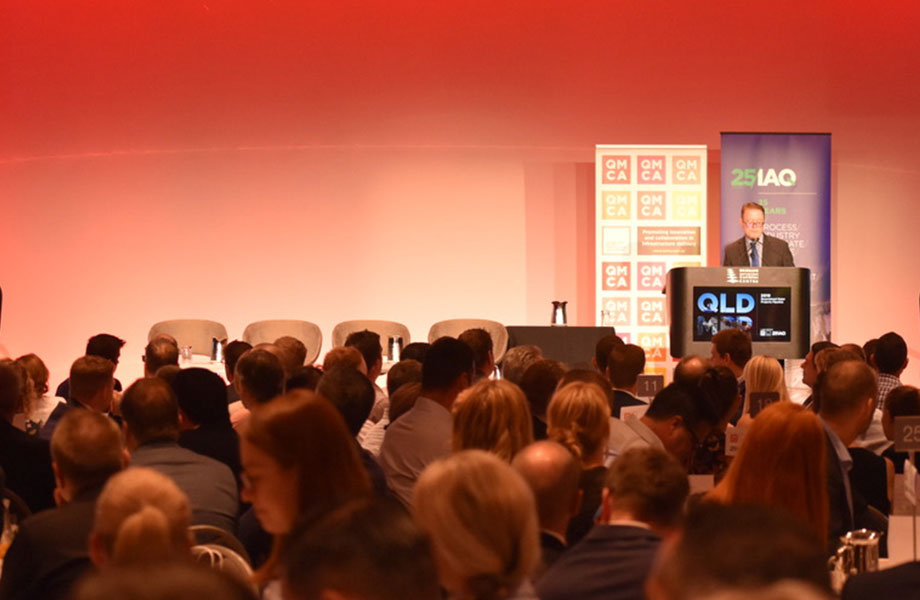Industry Report Shows the Need to Fast Track Projects
Queensland's record $41.3 billion infrastructure pipeline is likely to suffer a setback of $1.4 billion over the next two years, unless funding for new projects is secured.
A new report, commissioned by the Queensland Major Contractors Association (QMCA) and the Infrastructure Association of Queensland (IAQ) in conjunction with BIS-Oxford Economics, has examined 194 of the state's projects to be built by the private and public sector.
The report argues that for many regions and sectors, volatility in the pipeline, which is heavily weighted toward the new Inland Rail and $5.4 billion Cross River Rail, is placing pressure on construction industry contractors and suppliers.
The report also forecasts that the value of funded projects is set to fall by 24 per cent from $6.1 billion this year to $4.6 billion in 2019 unless funding for new projects was secured.
QMCA’s chief executive Jon Davies noted that in order to counteract the setback of $1.4 billion, currently unfunded projects such as Nullinga Dam, the Paradise Dam Spillway Improvement, Pacific Motorway Section C and Gold Coast Light Rail stage 3 would require immediate investment and procurement.
Related: Keep Up: Infrastructure Failing to Keep Pace with Demand for Housing
| Region | Worth | Notable Projects |
|---|---|---|
| Brisbane | $6.7bn | Cross River Rail, Brisbane Metro |
| Gold Coast | $1.3bn | Pacific Motorway upgrades, South Stradbroke recycled water pipeline |
| Ipswich, Logan & Toowoomba | $6bn | Inland Rail |
| Sunshine Coast | $1.6bn | Sunshine Coast Airport runway, Beerburrum-Nambour rail upgrade |
| Fitzroy | $4.55bn | LNG developments |
| Mackay | $6.3bn | Adani Carmichael coal mine, Clarke Creek Wind Farm |
| Townsville | $3.6bn | Singapore Defence Initiative, Sun Metals zinc refinery |
| Cairns | $1.6bn | Sarina to Cairns road upgrade, Kindston Solar Farm |
“Coming up with new funding and financing solutions will remain critical if growth in major project activities is to be sustained into the future,” QMCA chief executive Jon Davies said.
Of the total 194 projects identified over the next five years, 103, worth $27.7 billion, are funded and 91, worth $13.8 billion, are currently unfunded.
Investment in roads and telecommunications, predominantly funded by the public sector, and renewable energy generation and mining, mostly funded by the private sector, have propped up the state's pipeline over the past few years.
However, a 45 per cent fall in those four sectors is now predicted over the next two years.
While growth in rail, water, sewerage and defence infrastructure has lifted, analysts highlight that growth in those sectors will not reach the levels needed to offset the severity of the decline.
The report also identified that by 2021-22, 89 per cent of major funded project work would be concentrated in projects with an individual value of over $500 million.
“Nationally, we’re seeing a growing problem in delivering these complex mega projects on time and budget, and without costly disputation,” Davies said.
“We think there should be a re-think in how these projects are packaged.”
Related: Infrastructure Spending Set to Peak: Deloitte

Deputy premier Jackie Trad echoed the call for infrastructure funding from at a federal level in order to deliver on new road and rail projects, linking ports and supply chains, building renewable energy networks and delivering faster internet connections to Queenslanders.
“If we don't get that sequencing around critical infrastructure projects and fund and finance them in a multi-jurisdictional agreement then we are going to have significant problems, not only with the Queensland economy but with congestion and could effect the lifestyle of Queenslanders.”
“The collaboration committee is a big step forward in terms of implementing a collaborative approach, rather than just talking about projects.”
“We need to ensure that we are getting the funding and financing from the federal government to important projects if we are to see them succeed.”
The deputy premier called for a renewed focus on options on how to best serve the Port of Brisbane, backing the need for a new rail freight connection to Acacia Ridge.
“I think we need a dedicated freight connection from Acacia Ridge to the Port of Brisbane to secure the economic growth of our state,” Trad said.
“This would enable the South East Queensland region to compete globally and provide growth throughout the region.”
“It is fundamental to our future economic story in Brisbane.”
Related: Australia's Construction Pipeline is Worth $25bn

When projects already under procurement are accounted for, Queensland only has 15 out of 121 projects and initiatives identified for future investment on the current National Infrastructure Priority List.
IAQ’s chief executive Steve Abson noted that this level is around two to three times lower than QMCA and IAQ would prefer to see based on the share of national GDP and predicted population growth.
“We’re not seeing any projects originated in the pipeline that can really adapt our state to the impacts of climate, such as from cyclonic rains or drought,” Abson said.
“We believe there’s plenty of room to think differently about climate resilience and considerable opportunity for the development of major water projects in Queensland that support regional communities and expand agriculture and industry.”
Other recommendations made to the federal government through the report included asset recycling, tolling on major road projects and an increase in water projects to support regional communities.
Analysts also pushed for a more collaborative approach between government and the construction industry with the state facing a significant skill shortage in the workforce with a high level of competition particularly New South Wales and Victoria.
A call was also made to resolve federal funding contributions towards the $5.4 billion Cross River Rail project which has continued to stifle infrastructure growth in Queensland beyond its current budget commitments.
Queensland, which is already staring down a yawning $83 billion debt bill, also looks set to receive just six per cent of the $75 billion the federal government is committing to transport infrastructure across Australia over the next 10-years.
“That gives you a bit of context around which level of government is actually doing the heavy lifting here in Queensland when it comes to infrastructure projects and their delivery,” Deputy premier Jackie Trad said.
“I'm waiting to see what happens in the budget.”
“In terms of the profiling of critical infrastructure projects around our state as well as whether or not additional projects and funding for those projects in a timely manner will be represented in that budget, will be the telling factor here.”















